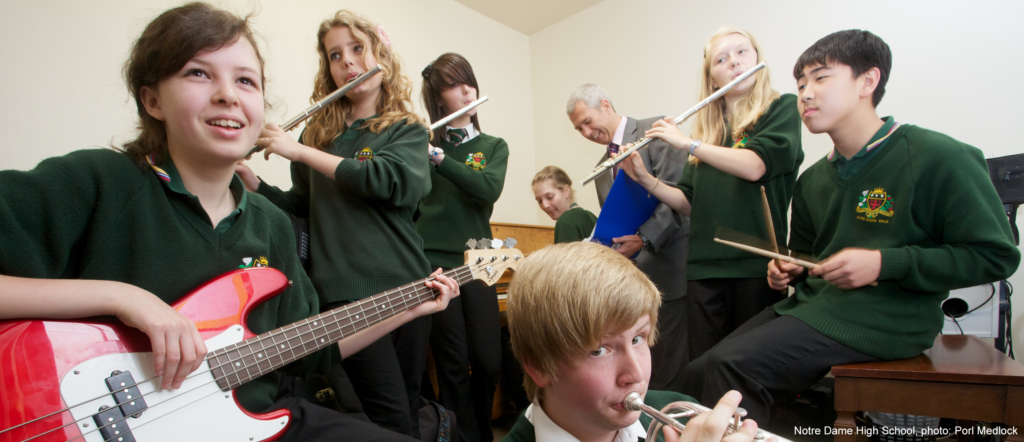
 Diana Walton shares the impact of Arts Award on metacognition, confidence and life skills
Diana Walton shares the impact of Arts Award on metacognition, confidence and life skills
Arts Award, a set of qualifications supporting young people to develop through the arts, is run by Trinity College London in association with Arts Council England. The awards are achieved by over 65,000 young people each year.
Among positive reactions from schools, Thomas Estley Community College, Leicester reports that this award has not only raised the profile and achievement in arts subjects in the college, but also ‘provided a creative haven where learners can build confidence and relationships, and take risks within a supportive environment.’
In 2016, a four-year longitudinal study led by London South Bank University tracked 60 students and surveyed hundreds more. It identified five key benefits of doing this award. The programme builds life skills; encourages young people to enjoy the arts and take arts courses; provides qualifications; opens the door on a wide range of careers; and develops entrepreneurial skills.
Building confidence and life chances
The study found that the award enables young people to build their confidence, organisational and communication skills, with a strong impact on those facing disadvantage or life challenges. It helped to strengthen their sense of self and supported unexpected achievement.
As well as developing their own arts practice, the award requires young people to share their skills in a real-life environment – doing work experience, teaching their peers or running an arts project in their school or community. Young people told researchers how these experiences built their ability to deal with people and situations, whether through weekend jobs or setting up their own business, as these comments demonstrate:
‘Arts Award gives you confidence in your ability. Now if something goes wrong, I can handle the situation.’
‘Working at [clothing chain] I have been able to apply the skills I have gained. It has made me confident to help customers without feeling apprehensive’
‘Though Arts Award I learned to try something, to be self-motivated to seek opportunities. That’s played a role through the last six years.’
The research also suggested that the award develops metacognition skills, helping students to organise and reflect on their own learning.
This can be valuable, as the Education Endowment Foundation Teaching and Learning Toolkit recommends developing metacognition and self-regulation as a high-return, low-cost intervention for schools looking to improve progress and attainment. It cites extensive supporting evidence and helpful strategies.
In the classroom, this means creating space to teach students how to plan, monitor and evaluate their work. Some suggestions:
- Explain that planning is a personal activity that helps us set a series of tasks towards a goal.
- Consider introducing a range of planning tools – some students prefer chronological planning, others take to mind-maps or spidergrams, like this digital plan from a young musician undertaking Gold Arts Award.
- Once the plan is in place, teach students how to review and record progress, asking themselves: are my tasks on track? What needs to change? Do I need help?
- And finally, help them to evaluate by posing two key questions: what would you do differently next time, and why?
Teachers may provide a supportive scaffolding, which is gradually removed as individuals take responsibility. Research shows that the time taken to introduce this approach pays dividends, especially with older students and low achievers.
‘The independent nature of the award helps students to focus on their own development in the way they want to,’ says John Lastauskas from Rochester Grammar School. ‘This gives them life skills (and UCAS points) that can put them ahead of others in university or job applications.’
Running Arts Award
The 2016 study suggests the award has benefits for all students, offering stretch for the most able and motivation for the less engaged. However, the arts are under pressure in schools today, and teachers may wonder how to fit Arts Award in. Part of the answer may lie in its flexible framework: it can work within an arts lesson, an after-school club or an enrichment programme. The award can also help to raise the attainment of pupil premium students.
Students can explore their personal interests, linking school-based activities with leisure pursuits. Assessment is by portfolio, which also gives them leeway to record their arts journey in the way that suits them – be that a journal, a video diary or a simple website. Get a taste of the variety from young people sharing their portfolios or find out how other schools run the award.
Training is widely available and there is plenty of support for teachers and students in schools registered as Arts Award centres. To discuss your school’s needs, contact Annabel Thomas, Trinity College’s Arts Development Manager on annabel.thomas@trinitycollege.co.uk.
Diana Walton is Arts Award Development Lead for Trinity College London, supporting research and development projects to extend the award’s reach to more young people: diana.walton@artsaward.org.uk.
Read more about developing a broader curriculum on the SSAT blog: Four pillars of principled curriculum design, to articulate and evidence curriculum intent.
